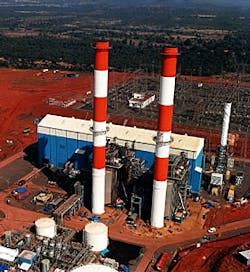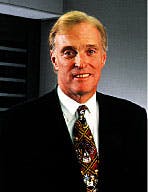Phase 1 of Dabhol power project starts up
Phase 1 of the Enron International-led Dabhol Power Co. megaproject began operating May 25. The first phase involves 826 MW of capacity, initially fired on naphtha. Enron and its partners have just secured financing for the second phase, expected to cost nearly $2 billion and add 1,624 MW of capacity, to be fired on natural gas.India's watershed Dabhol power project has begun operations. The plant is near the city of Dabhol on India's western coast, about 150 km south of Mumbai (OGJ, Sept. 7, 1998, p. 44).
Phase 1 of the Dabhol project has variable fuel capability but will be fired on naphtha until Phase 2 starts up. Phase 1 is owned by a joint venture comprising: Enron Corp. 50%, Maharashtra State Electricity Board (MSEB) 30%, Bechtel Enterprises Holdings Inc. 10%, and GE Capital Structured Finance Group 10%.
Meanwhile, a group led by Houston-based Enron International has secured financing for the $1.87 billion Phase 2 construction phase at the Dabhol Power Co. plant. Phase 2 will more than triple the plant's capacity, taking it to 2,450 MW from 826 MW. It will be fired on regasified LNG delivered from a terminal to be built near the power plant.
Phase 2 is owned by Enron 80%, and Bechtel and GE 10% each. MSEB has the option to acquire a 30% stake in Phase 2 from Enron, and Enron expects MSEB to exercise that option.
Electricity produced by Dabhol Power will be sold to MSEB under a 20-year purchase agreement.
Construction progress
Phase 1 of the Dabhol plant started up about 7 weeks ahead of the scheduled completion date of July 15. The Dabhol partners have the option of acquiring the required naphtha fuel domestically or on the international market."The source will depend on the best price," said Enron International Chairman and CEO Joseph W. Sutton. "The price of the fuel is a pass-through to the power customer," he added.
When Phase 2 of the project starts up in late 2001, the entire plant-including Phase 1-will be fired by natural gas from imported LNG. The LNG will be imported from Oman and Abu Dhabi.
The partners have signed a long-term supply agreement with Oman Liquefied Natural Gas, which will provide 1.8 million metric tons/year of LNG. And Abu Dhabi Gas Liquefaction Co. Ltd. will supply 400,000-500,000 tons/year to Dabhol. LNG imports are slated to coincide with start-up of Phase 2.
Enron has been in discussions with Qatar about potential LNG supplies for some time, and about the possibility of building a third LNG plant in the emirate. "We're still talking with them on the supply issues and the project," said Sutton. "It wasn't moving along that fast," he added, "so we went out and got LNG from other sources."
In the long run, this benefited the JV, said Sutton, because, after the Asian financial crisis, the LNG market became more competitive.
Dabhol Power is also planning to build LNG loading and unloading facilities, an LNG terminal with tank storage, and a regasification unit. It already has built housing, hospitals, and schools in the area.
When asked about Enron's additional plans in India, Sutton said his firm's long-term goal is to supply natural gas to West India. After completing the power project, Enron plans to use the regasification terminal to feed a pipeline infrastructure that will put gas into West India, where energy is needed badly.
"Financial close of the second phase realizes Enron's goal of bringing natural gas to the West Coast of India," said Sutton.
A complex financing
Sutton said the financing for the Phase 2 Dabhol project involved several law firms, representing the various participants, and more than 30 banks. He called the deal "the largest energy infrastructure project financing in India.""It was a long effort, but we're happy with the results," said Sutton. "It was probably one of the most complex (financings) ever done."
The process was made somewhat easier, he said, by the fact that it used basically the same lenders as Phase 1, with the exception of two new export-import banks, from Japan and Belgium. The first phase involved the U.S. Eximbank, but the limited U.S. sanctions resulting from India's nuclear testing last year suspended any such lending by U.S. banks for Indian projects (OGJ, May 25, 1998, p. 19). So U.S. Eximbank was replaced by its Japanese and Belgian counterparts.
The same Indian bank consortium was used for both project phases, and the commercial bank consortium was almost the same, said Sutton.
The $1.87 billion in financing for Dabhol's Phase 2 includes five loans totaling $1.414 billion, plus an equity investment of $452 million. The equity will come from Enron, GE, and Bechtel, based on their ownership percentages.
The loans are as follows:
- Rupee loans totaling $333 million from a group of Indian financial institutions, led by Industrial Development Bank of India and including Icici Ltd., State Bank of India, Industrial Finance Co. of India Ltd., and Canara Bank.
- A $497 million syndicated loan, coordinated by commercial banks SBI, ABN AMRO, Credit Suisse First Bos- ton, ANZ Investment Bank, and Citibank NA. Senior lead arrangers for this loan were Canara Bank, Bank of America, Development Bank of Singapore, and Credit Lyonnais.
- A $60 million project finance loan from Overseas Private Investment Corp.
- An export credit loan of $433 million, arranged by the Japanese Export Credit Agency, which supplied $258 million, with commercial banks providing the balance. For this loan, the commercial banks are insured by Japan's Ministry of International Trade and Industry, and Fuji Bank acted as agent.
- An export credit of $90.8 million, provided by a syndicate loan from commercial banks. Belgium's Office Nationale du Ducroire insured this loan, and ABN AMRO was agent for the commercial banks that provided it.
Enron International Chairman and CEO Joseph W. SuttonFinancial close of the second phase of the Dabhol power project realizes Enron's goal of bringing natural gas to the West Coast of India.
Copyright 1999 Oil & Gas Journal. All Rights Reserved.

